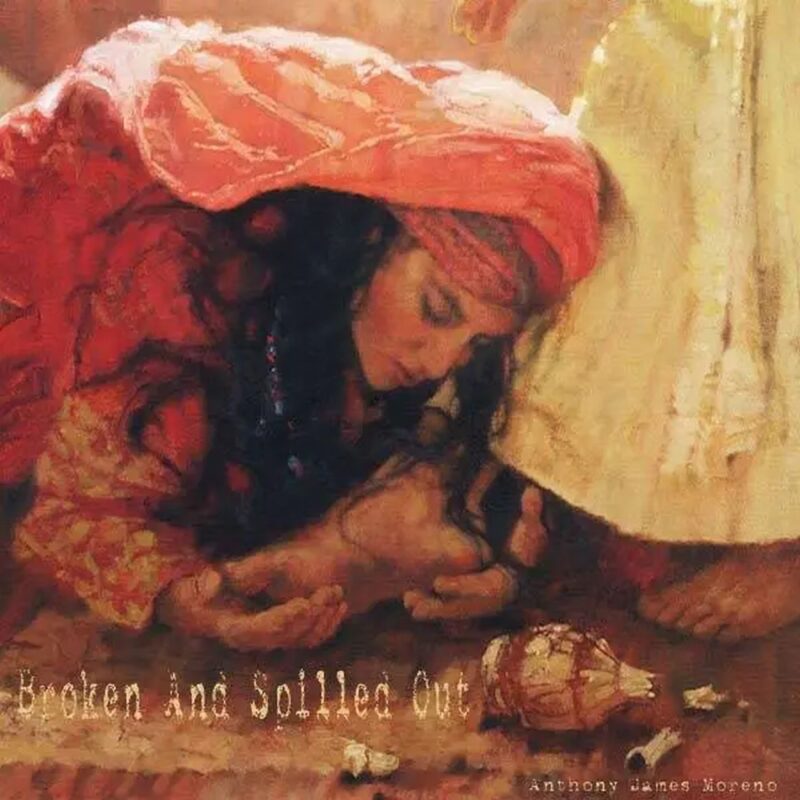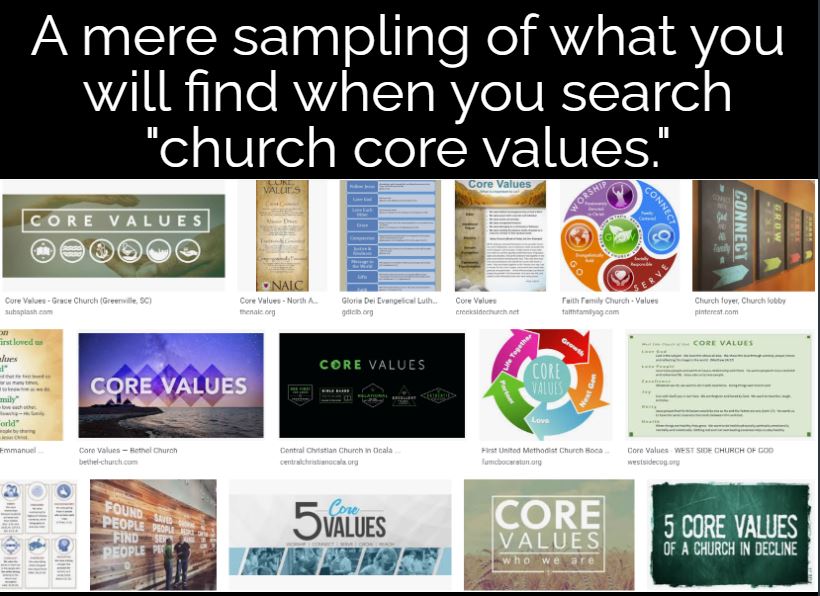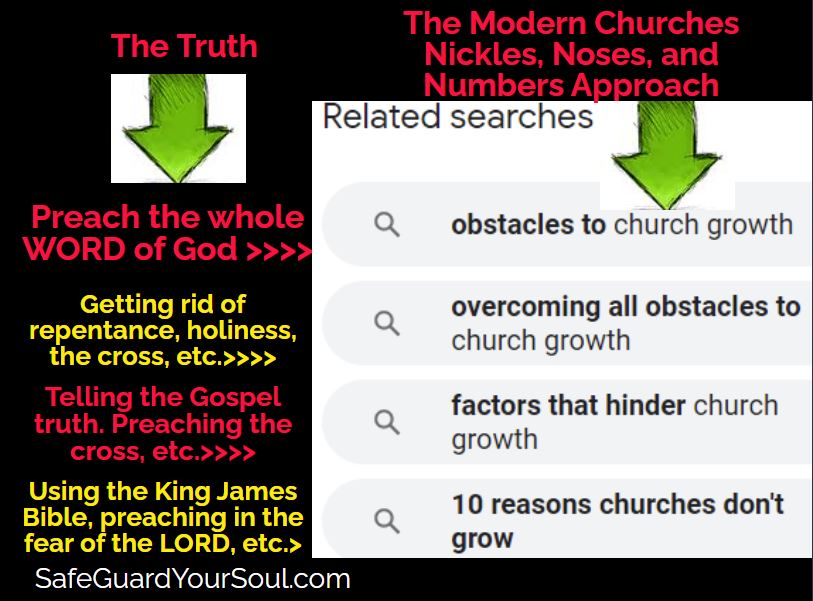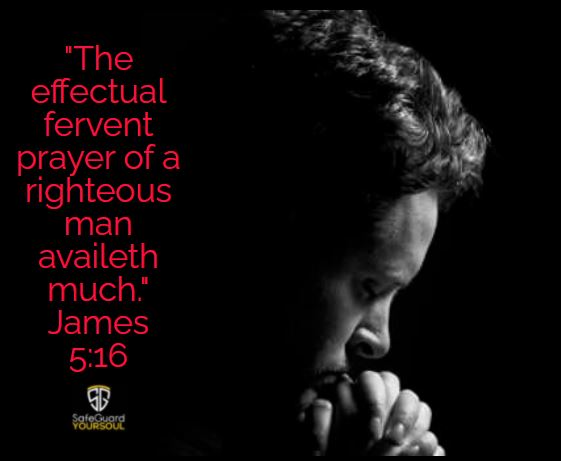
Self-Examination in Preparation for the Lord’s Return
by Paul Roberts
I’ve been doing some self-examination in preparation for the Lord’s return. The Lord is coming back for a glorious church, one without spot or wrinkle (i. e. blemish). Since the Lord’s return is imminent, we should redeem the time left by examining our own hearts before his return to prepare ourselves and be ready at his coming. Since it is easy for us to deceive ourselves into thinking our hearts are clean through our own eyes, I’ve had to go to the Word of God to allow it to discern and reveal to me the thoughts of my heart. I found that Galatians 5:19-21 is a good starting point to begin cleaning up the thoughts of my heart. The sins of the flesh, which are enumerated in these verses, I’ve found to be very revealing and those who are of the OSAS doctrine need to visit and meditate upon these verses and seek God’s mercy to forgive them and to cleanse them from any of these unrighteous “works of the flesh”.
Following are those “works of the flesh” which will, according to Galatians 5:19-21, prevent us from inheriting the kingdom of God and the peace of mind which passes all understanding. I used Strong’s Concordance, W. E. Vines Expository Greek Dictionary of New Testament Words, Webster’s Dictionary, and some scripture verses to define, as clearly as possible, these “works of the flesh” . These clearly defined sins of the flesh will allow us to elevate to a conscious level the sinful thoughts that may now reside in our hearts and minds so we can confess them to God before the return of Jesus and consciously begin to replace them with thoughts produced from the truth of the Word of God. We must necessarily go to the Word of God since it is quick and powerful and sharper than any two edged sword, piercing even to the dividing asunder of soul and spirit, and of the joints and marrow, and is a discerner of the thoughts and intents of the heart(Hebrews 4:12 KJV). For the kingdom of God is not meat and drink; but righteousness, and peace, and joy, in the Holy Ghost (Romans 14:17 KJV). Those sinful thoughts that will prevent us from inheriting the kingdom of God are enumerated in Galatians 5:19-21as follows:
I. Galatians 5:19-21: “Now the works of the flesh are manifest, which are these; Adultery, fornication, uncleanness, lasciviousness, idolatry, witchcraft, hatred, variance, emulations, wrath, strife, seditions, heresies, envyings, murders, drunkenness, revellings, and such like: of the which I tell you before, as I have also told you in time past, that they which dosuch things shall not inherit the kingdom of God.”
A. The sin of Adultery (Moicheia – Greek): Unlawful sexual intercourse with the spouse of another. Whoever looks on a woman to lust after her hath committed adultery with her already in his heart (Matthew 5:28 KJV). Lust, in this sense, is defined in scripture to mean: “to set the heart upon, i. e. long for (rightfully or otherwise): – covet, desire, would fain, lust (after).
B. The sin of Fornication (Porneia – Greek): Harlotry (incl. adultery and incest): fig. idolatry:—fornication. Illicit sexual intercourse. To act the harlot; indulge in unlawful lust (of either sex), practice idolatry:—-commit fornication. Metaphorically, of the association of pagan acts of idolatry with doctrines of, and professed adherence to, the Christian faith.
C. The sin of Uncleanness: (Akatharsia – Greek): impurity (the quality), physical or moral – uncleanness. Impure [lewd] or specifically [demonic]: – foul, unclean. Morally unclean (suggestive of the fact that sensuality and evil doctrine are frequently associated).
D. The sin of Lasciviousness: (Aselgeia – Greek): Licentious (sometimes including other vices including filthy conversation): – filthy, lasciviousness, wantonness. Denotes excess, licentiousness, absence of restraint, indecency, wantonness; one of the evils that proceed from the heart. The prominent idea is shameless conduct.
E. The sin of Idolatry:(Eidololatreia – Greek): image worship (literally or figuratively); – idolatry. Idolatry is breaking the first and greatest commandment of the blood covenant which prohibits having any other gods before Him (Exodus 20:3-6; KJV). An idolater is a slave to the depraved ideas his secret idols represent in the thoughts of his heart and mind on which he/she obsesses, and thereby, a slave to divers lusts such as the lust of the flesh, the lust of the eye, and the pride of life all of which include, but are not limited to, either food – Philippians 3:19 (KJV); outward appearances – 1st Samuel 16:7 (KJV); Matthew 6:1-18 (KJV); 1st Peter 3:1-4 (KJV); alcohol – Proverbs 20:1 (KJV); Isaiah 5:11 (KJV); Joel 1:5 (KJV); drugs or sorceries (i. e. Pharmakon – Greek: – a drug, i. e. a spell giving potion; a druggist [pharmacist] or poisoner) – Revelations 9:21 (KJV); sex – Matthew 5:28 (KJV); money – Ezekiel 7:19 (Amplified version); Matthew 6:19-24 (KJV); 1st Timothy 6:3-11 (KJV); Revelation 3:17 KJV; or graven images – Deuteronomy 4:15-19 (KJV), etc.)
F. The sin of Witchcraft: (Pharmakeia – Greek) Medication (Pharmacy – English translation), i. e. (by extens.) magic (lit. or fig.): — sorcery, witchcraft; (a drug, i. e. spell giving potion); a druggist (“pharmacist”) or poisoner, i. e. (by extens.) a magician:–sorcerer. Pharmakeia signified the use of medicine, drugs, spells; then, poisoning; then sorcery.
G. The sin of Hatred: (Echthra – Greek) – hostility; by impl. A reason for opposition: — enmity, hatred. (to hate) (pass. Odious, or act. Hostile); usually as a noun, an adversary (espec. Satan):—enemy, foe.
H. The sin of Variance: (Dichazo – Greek) A quarrel, i. e. (by implication) wrangling: – contention, debate, strife, variance. To cut apart, divide in two. Strife in Galatians 5:20 is rendered variance. Variance is both in a “good” sense and a “bad” sense. In Matthew 10:35 variance is used in a good sense as respects the position of a believer being at variance with his non-believing family when Jesus said that he didn’t come to send peace on the earth: but a sword. For he came to set a man at variance against his father——. Contention, or variance, is used in a bad sense when it emanates from pride as shown in Proverbs 13:10.
I. The sin of Emulations: (Zelos- Greek) – Zeal in a favorable sense, ardor; in an unfavorable sense, jealousy, as of a husband [figuratively of God], or an enemy, malice): – emulation, envy (-ing). fervent mind, indignation, jealousy, zeal. Jealousies (incl. jealousies of a husband) are used in an unfavorable sense in Galatians 5:20. Jealously in its word definition means: Intolerant of rivalry or unfaithfulness. Disposed to suspect rivalry or unfaithfulness. Apprehensive of the loss of another’s exclusive devotion. Hostile toward a rival or one believed to enjoy an advantage. Vigilant in guarding a possession. Distrustfully watchful, suspicious. The spirit of jealousy based on unfounded suspicions is a sin. There is no court of law that would throw out the “rules of admissible evidence” and convict a person based on suspicions alone. Those suspicions arising from probable cause will not suffice to convict. Only upon truth being received by way of either revelation of the Lord according to His prescribed test for infidelity could a person be convicted of infidelity or by the presentation of hard evidence that is admissible in a court of law could a jury truthfully convict another person of infidelity or unfaithfulness (e. g. Numbers 5:14-31; Deuteronomy 17:6; Matthew 18:16 KJV). So, unless a jealous spouse can put forward hard evidence to substantiate their suspicions based on probable cause then they should repent of their sin of “emulation” or jealousy which would, otherwise, prevent them from inheriting the kingdom of God.
J. The sin of Wrath: (Thumos – Greek) – passion (as if breathing hard); – fierceness, indignation, wrath. Hot anger, passion. An agitated condition of the feelings, or an outward burst of wrath arising suddenly from inward indignation. Unlike the Greek word “orge” which suggests a more settled or abiding condition of the mind, frequently with a view to taking revenge.
K: The sin of Strife: (Eritheia – Greek) – to stimulate (espec. To anger): – provoke. Intrigue, i. e. (by impl.) faction: – contention (-ious), strife. Denotes ambition, self-seeking, rivalry, self-will being an underlying idea in the word; hence it denotes party-making (i. e. sectarian or denominationalism). It is derived, not from eris, strife, but from erithos, a hireling; hence the meaning of seeking to win followers, “factions,” so rendered in R. V. or 2nd Corinthians 12:20, A. V., “strifes;” not improbably the meaning here is rivalries, or base ambitions.
L: The sin of Seditions: (Dichostasia – Greek) – Literally, a “standing apart (dicha, asunder, apart, stasis, a standing). Hence, a dissension, division, is translated seditions. Disunion, i. e. (fig.) dissension: – division, sedition. A derivative of the Greek word “stasis” which means popular uprising; fig. controversy: – dissension, insurrection.
M: The sin of Heresies: (Hairesis – Greek) – denotes (a) a choosing, choice (from haireomai, to choose); then, that which is chosen, and hence, an opinion, especially a self-willed opinion, which is substituted for submission to the power of truth, and leads to division and the formation of sects, Galatians 5:20 (marg., “parties”); such erroneous opinions are frequently the outcome of personal preference or the prospect of advantage. A choice, i. e. (spec.) a party or (abstr.) disunion: – heresy [which is the Greek word itself], sect. An opinion or doctrine contrary to the truth. Adherence to a religious opinion contrary to church dogma established by the inspired scriptures.
N: The sin of Envyings: (Phthonos – Greek) – envy, is the feeling of displeasure produced by witnessing or hearing of the advantage or prosperity of others; this evil sense always attaches to this word. There is a distinction between jealously and envy. Envy desires to deprive another of what he/she has whereas jealously desires to retain possession of that which he/she already has to the exclusion of all others. Envy is a painful or resentful awareness of an advantage enjoyed by another joined with a desire to possess the same advantage.
O. The sin of Murders: (Phonos – Greek) – in the plural of murders. The word “murders” is also rendered slaughter.
P. The sin of Drunkenness: (Methe) – strong drink (akin to methu, wine), denotes drunkenness, habitual intoxication – Galatians 5:21. The fact that habitual intoxication will prevent us from inheriting the kingdom of God in that it is considered a sin or a work of the flesh, should point up the truth that one can only be set free from captivity to that sin by redemption through the redeeming blood of Jesus. Redemption in it’s word definition means: “To pay the price for something with the idea of setting it free,——-live a slave.” Jesus paid the ransom price of His blood to set us free from captivity to sin which includes “drunkenness”.
This definition of drunkenness as a sin and redemption as sin’s cure should scuttle the heresy of the doctrine of Alcoholics Anonymous which puts forth the idea that alcoholism is a sickness, not a sin, and that it can be managed by help from a higher power whatever or whoever that power may be in the eyes of the alcoholic, by attending meetings regularly, and by stating at each meeting that they are alcoholics. First of all, as scripture clearly states, drunkenness is a sin not a sickness (Galatians 5:21 KJV). Secondly, not just any higher power will do the job of delivering us from sin. There is no other name under heaven, given among men whereby we must be saved other than the name of Jesus (Acts 4:12 KJV). Finally, someone repetitively stating that they are an alcoholic is contrary to scripture’s instruction to those sinners who are redeemed to say so (Psalms 107:2 KJV). Following is an account of the state of the apostle Paul who described his captivity to sin prior to being redeemed by the blood of Jesus: “For we know that the law is spiritual: but I am carnal, sold under sin. For that which I do I allow not: for what I would, that do I not; but what I hate, that do I. If then I do that which I would not, I consent unto the law that it is good. Now then it is no more I that do it, but sin that dwelleth in me. For I know that in me (that is in my flesh) dwelleth no good thing: for to will is present with me; but how to perform that which is good I find not. For the good that I would I do not: but the evil which I would not, that I do. Now if I do that I would not, it is no more I that do it, but sin that dwelleth in me. I find then a law that, when I would do good, evil is present with me. For I delight in the law of God after the inward man: But I see another law in my members, warring against the law of my mind, and bringing me into captivity to the law of sin which is in my members. O wretched man that I am! Who shall deliver me from this body of death? I thank God through Jesus Christ our Lord. So then with the mind I myself serve the law of God; but with the flesh the law of sin” – (Romans 7:14-25 & 8:3-4 KJV). Notice, he was delivered from captivity to the law of sin in his members through Jesus Christ, not some organization like AA.
Scripture, contrary to the so-called “BIG BOOK” put out by Alcoholics Anonymous, states the following regarding our former captivity to habitual sin before our redemption by blood through faith in the crucifixion of our flesh with Christ: “For if we have been planted together in the likeness of his death, we shall also be in the likeness of his resurrection: Knowing this, that our old man is crucified with him, that the body of sin might be destroyed, that henceforth we should not serve sin. For he that is dead is freed from sin. Now if we be dead with Christ, we believe that we shall also live with him: Knowing that Christ being raised from the dead dieth no more: death hath no more dominion over him. For in that he died, he died unto sin once: but in that he liveth, he liveth unto God. Likewise reckon ye also yourselves to be dead indeed unto sin, but alive unto God through Jesus Christ our Lord. Let not sin therefore reign in your mortal body, that ye should obey it in the lusts thereof. Neither yield ye your members as instruments of unrighteousness unto sin: but yield ye yourselves unto God, as those that are alive from the dead, and your members as instruments of righteousness unto God. For sin shall not have dominion over you: for ye are not under the law, but under grace. What then? shall we sin, be cause we are not under the law, but under grace? God forbid. Know ye not, that to whom ye yield yourselves servants to obey, his servants ye are to whom ye obey; whether of sin unto death, or of obedience unto righteousness? But God be thanked, that ye were the servants of sin, but ye have obeyed from the heart that form of doctrine which was delivered unto you. Being made free from sin, ye became the servants of righteousness. For what the law could not do, in that it was weak through the flesh, God sending his own Son in the likeness of sinful flesh, and for sin, condemned sin in the flesh: that the righteousness of the law might be fulfilled in us, who walk not after the flesh, but after the Spirit” (Romans 6:5-18 KJV).
Read chapters 6, 7, and 8 of Romans to understand that Romans 7:14-24 is not Paul’s condition after his redemption by blood, but before his redemption and, therefore, stop trying to manage the sin of habitual intoxication as though it’s just a sickness or some genetic predisposition. How do I know this to be true? First and foremost, it’s the truth according to scripture. Secondly, I was once alcoholic but was delivered instantly by the power of God. Now, rather than saying my name is Paul Roberts and I’m an alcoholic, I say instead, I am redeemed (i. e. I am delivered and set free from the sin of drunkenness for whoever the Lord sets free is free indeed – John 8:36 KJV). Let the redeemed of the Lord say so (Psalms 107:2 KJV).
Q. The sin of Revellings: (Komos – Greek) – a revel, carousal (as if a letting loose), the concomitant and consequence of drunkenness, is used in the plural in Galatians 5:21.
Thought my examination of the thoughts of my own heart through means of the discerning words of Scripture would be helpful to others as well.
Paul Roberts
Making Peace with God | Fresh Start with God
Sign up for free email devotional HERE… The Moments with My Master email devotional is sent out for the edification of the body of Christ.
Abiding
The Core Values of the Modern Church Agenda Exposed [podcast]

Lots of occultic symbolism in the art below.
The “church growth” industry is a multi-million dollar enterprise with books, seminars, selling sermons, etc., on how to build a large church, how to grow the nickels, noses, and numbers. Is this what Jesus had in mind when He stated “I will build my church”? (Matthew 16:18)
“Ye are bought with a price; be not ye the servants of men.” 1 Corinthians 7:23
Do you spend more time in “church” than in the Bible itself? Wow! Red flags flying!
“Ye therefore, beloved, seeing ye know these things before, beware lest ye also, being led away with the error of the wicked, fall from your own stedfastness.” 2 Peter 3:17
So you are listening to some slick talker preach and yet he’s not using the BIBLE essential words like hell, repentance, holiness, the cross, the blood of Jesus, the return of Christ, etc? Repent and RUN!
The vast majority of so-called pastors today are more interested in getting you to join their church club, to become a member of their church, than they are about truly feeding the flock of God with the whole counsel of Scripture, equipping you for ministry, and winning souls to Jesus (John 21:15-17; Acts 20:20-32; Ephesians 4:11-12; 1 Peter 5:1-6, etc.). Prove it wrong.
Church Membership Exposed | The 501(C)(3) Deception | The Modern Church
Support | STORE | Podcasts | The Return of Christ | Stewardship | Apostate Modern Church Exposed | Beware of the BUZZ WORD Bandits [podcast] | Preach the Word | Wolves Exposed



Abiding
Mary hath Chosen that Good Part [podcast]

Luke 10:38-42
Mary = loving relationship with Jesus, not just being busy with doing, with labor, with performing works such as what Martha was doing. First and foremost, Jesus saved us for relationship with Him and the Father (John 17:3). And here our Savior expresses that knowing, loving, adoring, and listening to Him are at a divine premium, they are most important to God. That’s what God desires – for us to delight ourselves in Him (Psalms 37:4).
“Delight thyself also in the LORD; and he shall give thee the desires of thine heart.” Psalms 37:4
David’s brothers looked the part but they couldn’t and wouldn’t even face Goliath, much less slay him. David though, was spending time alone with the LORD, listening to His voice and tending to the sheep. He who is the only man God ever said was “a man after mine own heart,” was used mightily of God to slay the giant (Acts 13:22; 1 Samuel 17).
Isn’t this how we are with our children? Wouldn’t every parent rather their precious children sit in their mom or dad’s lap telling their parent how much they (the child) loves them (the parent)? That’s the biggest heart melt we know, right?
Like David, the most powerfully used warriors are first worshippers.
Our real, our genuine relationship with the LORD is that place out of which His power and grace (divine enablement) will flow. Like David, we must be primarily, and first and foremost worshippers. Out of that rich communion with the Savior will flow the warrior anointing of the LORD who is “a man of war” (Exodus 15:3).
Many who sense the call of God on their lives to minister go to seminary. Sad. We must go to God ourselves – in prayer, a life of prayer, relentlessly seeking His holy face in His Word for ourselves.
“But thou, when thou prayest, enter into thy closet, and when thou hast shut thy door, pray to thy Father which is in secret; and thy Father which seeth in secret shall reward thee openly.” Matthew 6:6
Private prayer with the LORD precedes God using us. Those who seek God in “secret” will be “openly” rewarded by Him.
“The little estimate we put on prayer is evidence from the little time we give to it.” EM Bounds
“A sinning man stops praying. A praying man stops sinning.” – Leonard Ravenhill
Luke 10
38 Now it came to pass, as they went, that he entered into a certain village: and a certain woman named Martha received him into her house.
39 And she had a sister called Mary, which also sat at Jesus’ feet, and heard his word.
40 But Martha was cumbered about much serving, and came to him, and said, Lord, dost thou not care that my sister hath left me to serve alone? bid her therefore that she help me.
41 And Jesus answered and said unto her, Martha, Martha, thou art careful and troubled about many things:
42 But one thing is needful: and Mary hath chosen that good part, which shall not be taken away from her.
“Mary hath Chosen that Good Part”
The “good part” Mary chose consists of…
- Mary made the only wise choice “Mary hath chosen.”
- Mary put Jesus first. She put the Savior first, not herself or her idea of what it meant to serve Him.
- Jesus says here that choosing to put and keep Him first is the “one thing [that] is needful” or most necessary (v39, 42).
- Sitting before Jesus Himself and not searching for God outside of God Himself, primarily that is. All other learning is supplemental and subservient to that which the LORD tells us specifically, in His Word.
Worshippers become the most powerful workers God uses!
Like many today who are shallow rooted, Martha was a worker but not first and foremost a worshipper. Mary was a worshipper who loved to spend time with Jesus. Therefore she was empowered by God Himself via that fellowship with Him to walk in His holy compassion and to do His works with His power and for His glory (1 Corinthians 15:10).
When our works are not fruitful as they should be, perhaps it can be traced back to our lack of fellowship with our LORD. As we fellowship with Him, putting Him first and not ourselves, our vessel, our cup will run over with His goodness…. it will spill over onto others! (See Psalms 23:5.) That’s when our labor will carry His eternal weight of glory (2 Corinthians 4:17).
“Thou preparest a table before me in the presence of mine enemies: thou anointest my head with oil; my cup runneth over.” Psalms 23:5
When Jesus came, it was God bringing Heaven to the people – to forgive their sins and make them whole (Matthew 9:6). This was the foretold fulfillment of His kingdom coming on earth as it is in heaven (Matthew 6:10).
When Jesus came, He went to the people, to heal, to save, to make whole (Matthew 9:35-38; Acts 10:38, etc.).
As we go, Jesus is with us, “even unto the end of the world. Amen” (Matthew 28:20).
Daily, our LORD is using His people to bring Heaven to the people. As the Holy Spirit fills our lives, His blessed presence and fruit in our lives is going to over overflow onto others.
A sister in Christ once told me that “The best Marthas are first Marys.” Think about that one in light of what we read in this passage when Jesus visited the home of Mary and Martha (Luke 10:38-42). Those who sit at Jesus’ feet to hear His holy counsel, are changed into His image and become reservoirs for His blessed glory. Their cups run over onto others!
“Prayer is of transcendent importance. Prayer is the mightiest agent to advance God’s work. Praying hearts and hands only can do God’s work. Prayer succeeds when all else fails.” E.M. Bounds
When worshiping Jesus is our first priority, the work He uses us to do WILL carry His unction and bring fruit to bear for His eternal glory.
Rote obedience to minister to others, while not anchored in intimacy with our LORD, will not yield an abundant harvest, fruit. In contrast, we can be blessed to have God’s power and grace to do His work and that happens as we are truly communing, fellowshipping in the construct of that oneness relationship He made us for (John 15; 17).
Knowing God’s Word and obeying Him is not an automatic progression (John 8:31-36). One can know the Bible and not its Author. Or, one can know the Bible well and not know the Author well (Job 22:21-28). Obeying God’s Word requires knowing Him, abiding in an intimate fellowship with Him, thereby enabling that saint the grace (divine enablement) to obey Him (John 5:39-40; 7:17; 14:21-23; 15:1-16, etc.).
Martha “received him.” Many of us have “received” Jesus, have been saved by Him (John 1:12), yet like Martha we aren’t sitting at His holy feet, listening to Him speak through His Word. Like Martha, we also are “cumbered about much serving.”
It should be understood that our work can exceed our worship, our hospitality can exceed our holiness, our serving can exceed our sanctification, etc. That would be defined as imbalance (Proverbs 11:1).
In Luke 10:38-42, notice that Mary sat directly at Jesus’ feet and no other. When we arise in the morning to commune with the LORD, such is to be direct communication between you and Him, alone (Matthew 6:6). That would mean perhaps that when you arise in the morning you aren’t reading some other book about God or turning on a podcast or TV program to find and commune with the LORD. No, those things involve others. We must directly commune with the LORD in prayer and in HIS Word. How else shall we be able to discern the “MANY false prophets” Jesus warned us “shall deceive many”? (Read Matthew 24:11; 1 John 4:1.) How can we know the counterfeit if we don’t know the real? We can’t.
In principle, Martha is a person like Cain, a person who chose to do things their own way, not God’s – because they are not truly submitted to God. Does that describe your life friend? Jesus calls us home to Himself (Matthew 11:28-30).
Are we attempting to serve the LORD on our own terms or are we sitting before Him, hearing His voice as we are worshipfully, joyfully submitted to Him on His stated terms?
“The men who have done mighty things for God have always been mighty in prayer, have well understood the possibilities of prayer, and made the most of these possibilities. The Son of God, the first of all and the mightiest of all, has shown us the all-potent and far reaching possibilities of prayer. Paul was mighty for because he knew, how to use, and how to get others to use, the mighty spiritual forces of prayer.” EM Bounds, The Complete Works of E.M. Bounds on Prayer, P. 341
When we are brought to the point of true repentance it will be obvious in that we will do things God’s way and no longer our own. Like Mary, we will be settled at His feet, hearing His Word, His voice. The Mary person is in love with and submitted to the LORD and Savior she so joyfully worships.
“Jesus never taught His disciples how to preach, only how to pray. To know how to speak to God is more than knowing how to speak to people. Power with God is the first thing, not power with people. Christ loves to teach us how to pray.” –Andrew Murray, With Christ in the School of Prayer, pp. xxiii-xxiv
Support | STORE | Podcasts | The Bridegroom is Calling His Bride | Purifying Ourselves as He is Pure [podcast] | 10 Clues Your Love for God is Waxing Cold [podcast] | More on the Sabbath of the New Testament – Jesus!



Apostasy
Modern Day Frauds and How They Operate [RADIO]

THIS is so very important! Please listen and share to help others (Ezekiel 44:23).
“And they shall teach my people the difference between the holy and profane, and cause them to discern between the unclean and the clean.” Ezekiel 44:23
Support | STORE | Podcasts | The Deeds and Doctrines of the Nicolaitans 1 | Witchcraft in the Pulpits | Witchcraft in the Church | Are You Under the Spell of Witchcraft? | Getting Delivered from Witchcraft | Fellowship God’s Way | Beware of the “I Love My Church” Deception [podcast] | Un-Biblical Local Church Structures [podcast] |





















































Todd
September 30, 2023 at 12:20 pm
Hope you are well Gregory. May God’s blessings abound to you in the name of Jesus Christ our LORD. Glad to have you as a friend. Todd